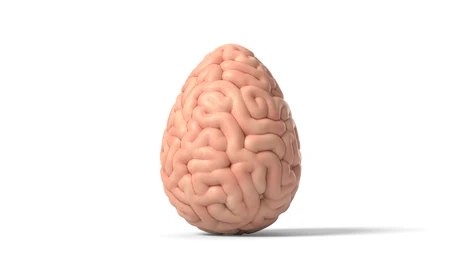Choline: An Important Nutrient for a Healthy Brain

Imagine a picture of a brain where the lower part is a cracked egg. That’s because eggs are full of choline — a nutrient that helps our brains work better and may even help reduce anxiety. But are you getting enough of it?
Many people have never heard of choline, but studies show that it’s very important for our health, especially as we grow.
Choline is not a vitamin or a mineral. It’s an organic compound that our bodies need, especially for the nervous system to work properly. Scientists are now finding that choline may help with learning, memory, and even protect against brain disorders like ADHD and dyslexia.
In one study, babies whose mothers took choline during pregnancy had faster brain processing speeds. That means their brains worked better when solving tasks. Scientists believe choline is a “wonder nutrient,” but it often doesn’t get enough attention. So, where can we find choline, and are we eating enough of it?
Why Choline is Important
Professor Xinyin Jiang from Brooklyn College in New York says that every single cell in our body contains choline.
Choline is called an “essential” nutrient. That means we need it, but our bodies don’t make enough of it by themselves. So we must get it from food, just like omega-3. Choline is also similar to B vitamins, says nutrition expert Emma Derbyshire.
Where to Find Choline
Choline is found mostly in animal foods like:
- Eggs
- Beef
- Chicken
- Fish
- Milk
But it is also in plant foods like:
- Peanuts
- Kidney beans
- Mushrooms
- Broccoli
- Soybeans (which have 120mg per 100g!)
Animal foods usually have more choline than plant foods.
Our body needs choline for many jobs. For example, it helps move fat out of the liver. Without enough choline, fat can build up in the liver and cause problems.
It also helps build phospholipids — these are special parts of cells that help cells grow and divide. For unborn babies, not getting enough choline can stop their brain cells from growing properly.
Choline and the Brain
Choline is very important for the brain. Our bodies use it to make acetylcholine — a chemical that helps the brain send messages to the rest of the body. This chemical is key for learning, memory, and thinking.
In one study of about 1,400 adults aged 36 to 83, people who had more choline in their diet had better memories. Choline is also used in brain-boosting supplements called nootropics.
Not getting enough choline may be linked to serious brain problems like Alzheimer’s and Parkinson’s disease.
Choline may also help mental health. Some studies showed that people who ate more choline felt less anxious or depressed.
More Health Benefits
Choline also helps with:
- Heart health: It lowers a harmful amino acid called homocysteine.
- Stronger bones: People who eat more choline usually have higher bone density, meaning stronger bones.
Researcher Øyen Jannike from Norway says that choline might help stop bone loss because of its role in cells and its effect on homocysteine.
The First 1000 Days Matter Most
The first two years of a baby’s life are super important for their growth. A mother’s diet during pregnancy and breastfeeding can affect the baby’s brain.
Babies are actually born with three times as much choline as their mothers, which shows how much they need it!
Studies show that the amount of choline a baby gets in the womb is linked to how smart they are later. In one study, women who ate the most choline during the middle of pregnancy had children with better memory at age seven.
Some scientists believe that not getting enough choline during pregnancy could be one reason some kids develop ADHD.
How Much Choline Do We Need?
In Europe:
- Adults: 400mg/day
- Pregnant people: 480mg/day
- Breastfeeding: 520mg/day
In the US:
- Men: 550mg/day
- Women: 425mg/day
- Pregnant women: 450mg/day
- Breastfeeding: 550mg/day
Food amounts:
- 1 egg = about 150mg
- Chicken breast = 72mg
- A handful of peanuts = 24mg
In 2017, doctors suggested that pregnancy vitamins should include choline.
Emma Derbyshire says that some problems like ADHD and dyslexia may partly be due to not getting enough nutrients like choline before birth.
What Do Studies Show?
Jiang and other scientists have found that more choline during pregnancy can help babies develop better brains. In animals, this is already clear, and we are starting to see it in humans too.
A study in 2020 looked at 38 animal and 16 human studies. It found that choline helps brain development. Human studies used up to 930mg of choline per day (about 6 eggs), with no harmful effects.
Some people may need even more choline, like:
- Women after menopause
- People with fatty liver disease
- People with special genes that make them need more
When we eat choline-rich food, our bodies absorb it easily, says Jiang. But many people still don’t get enough.
One study found that only 11% of American adults eat enough choline every day.
Are Vegans Getting Enough?
Eggs are a great source of choline, but people who don’t eat animal products may not get enough. Choline is also found in:
- Tofu: 28mg per 100g
- Peanut butter: 61–66mg per 100g
- Soybeans: 120mg per 100g
If someone is worried they aren’t getting enough choline, they can take supplements.
Derbyshire says that doctors are now learning more about choline, and she hopes it will get more attention in the future.
